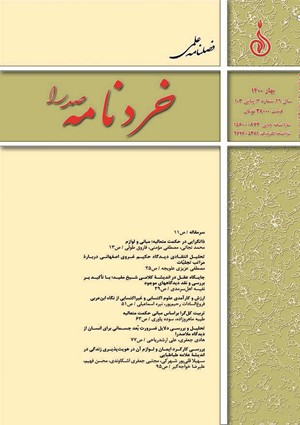ذاتگرايي در حكمت متعاليه؛ مباني و لوازم
محورهای موضوعی : ملاصدراپژوهی و اندیشۀ حکمت متعالیهمحمد نجاتی 1 , مصطفی مومنی 2 , فاروق طولي 3
1 - استادیار گروه معارف اسلامی، دانشگاه علوم پزشکی هرمزگان، بندرعباس، ایران
2 - استادیار گروه معارف اسلامی، دانشگاه علوم پزشکی نیشابور، نیشابور، ایران
3 - استادیار گروه معارف اسلامی، دانشگاه علوم پزشکی هرمزگان، بندرعباس، ایران
کلید واژه: اطلاق گرایی ذات گرایی اصالت وجود ذاتی عرضی حكمت متعاليه,
چکیده مقاله :
«ذاتگرايي» بمعناي استقلال اشياء خارجي از علايق و ادراك انسانهاست. در سنت فلسفة اسلامي، عموماً با نگرشي ايجابي، اشياء مجموعهيي از صفات ذاتي و عرضي دانسته شده كه از انديشة انسانها مستقل هستند. اين مسئله در تفكر ملاصدرا نيز دو وجه عمده مييابد. او در رويكرد عام خويش، بنابر مشرب قوم و بويژه ابنسينا، اشياء خارجي را مستقل از ادراك بشري و متشكل از مجموعه صفات ذاتي و عرضي ميداند. صدرالمتألهين در رويكردي خاص، ضمن تأكيد بر استقلال وجودي اشياء خارجي، بر اساس مباني وجودي و معرفتي تفكر خود، ذات اشياء خارجي را در حقيقتِ واحد و فارد وجود منحصر كرده و با نفي هرگونه تأصلِ خارجيِ اجزاءِ ذاتي و عرضي و همچنين كليه لواحق ماهوي، تركيب احتمالي موجودات از دوگانههاي ماده و صورت يا جنس و فصل را مربوط به عالم ذهن و ذيل قدرت خلاقيت نفس قلمداد ميكند.
Essentialism indicates the independence of external objects from human interests and perceptions. In Islamic philosophy, based on an affirmative approach, objects are generally considered to be a collection of essential and accidental attributes which are independent from human thought. This problem has two major dimensions in Mullā Ṣadrā’s philosophy. In his own general approach, based on the common tradition of philosophers, particularly Ibn Sīnā, Mullā Ṣadrā also maintains that external objects are independent from human perception and consist of a series of essential and accidental attributes. Following a specific approach, Mullā Ṣadrā limits the essence of external objects to the single and unique truth of existence while emphasizing the ontological independence of external objects and based on the ontological and epistemological principles of his own philosophy. Moreover, through negating any kind of external origin for essential and accidental components as well as all quiddative consequents, he believes that existents’ possible synthesis of matter and form or genus and differentia is related to the world of the mind and subcategorized under the soul’s power of creativity.
آشتياني، سيدجلالالدين (1382) هستي از نظر عرفان و فلسفه، قم: بوستان كتاب.
ابنسينا (1375) النفس من كتاب الشفا، تحقيق حسن حسن زاده آملي، قم: بوستان كتاب.
ابنسينا (1376) الالهيات من كتاب الشفا، تحقيق حسن حسن زاده آملي، قم: بوستان كتاب.
ابنسينا (1404) التعليقات، تحقيق عبدالرحمن بدوي، قم: مركز النشر التابع لمكتب الاعلام الاسلامي.
ابن رشد (1387) تهافت التهافت، ترجمه حسن فتحي، تهران: حكمت.
تبريزي، ملارجبعلي (1386) اصل الاصيل، تهران: انجمن آثار و مفاخر فرهنگي.
جوادي آملي، عبدالله (1375) رحيق مختوم؛ شرح حكمت متعاليه، قم: اسراء.
حائري يزدي، مهدي (1380) سفر نفس، بكوشش عبدالله نصري، تهران: نقش جهان.
رازي، فخرالدين محمد بن عمر (1429) المباحث المشرقيه في العلم الهيات و طبيعيات، قم: ذوي القربي.
سهروردي (1380) مجموعه مصنفات شيخ اشراق، تصحيح و مقدمه هانري كربن و ديگران، تهران: پژوهشگاه علوم انساني و مطالعات فرهنگي.
طباطبائي، سيدمحمد حسين (1388) بررسيهاي اسلامي، قم: بوستان كتاب.
طباطبائي، سيدمحمد حسين (بي تا) الميزان في تفسير القرآن، قم: منشورات جامعه مدرسين حوزة علميه.
فروغي، محمدعلي (1317) سيرحكمت در اروپا، تهران: شركت كانون كتاب چاپ گودرزي.
فياضي، غلامرضا و ديگران (1384) «عينيت وجود و ماهيت»، فصلنامه كتاب نقد، شمارة 35: ص273ـ306.
قرباني، نيما و واتسن، پي. جي (1382) «مباني روششناسي الگوي محيط ايدئولوژيك در دين پژوهي تجربي»، مقالات و بررسيها، دفتر74: ص36ـ9.
عليزاده، بيوك (1383) «نظريه معرفتشناختي صدرا در بوته توجيه»، نامه حكمت، دوره2 (3): ص50ـ29.
كاپلستون، فردريك (1385) تاريخ فلسفه؛ يونان و روم، ترجمة سيد جلالالدين مجتبوي، تهران: علمي فرهنگي.
مصباح يزدي، محمد تقي (1378) شرح نهاية الحكمه، تحقيق و نگارش عبدالرسول عبوديت، قم: مؤسسة امام خميني.
مطهري، مرتضي (1383) مجموعه آثار، تهران: صدرا.
ملاصدرا (1363) المشاعر، تهران: كتابخانه طهوري.
ملاصدرا (1380) الحكمة المتعالية في الاسفار الاربعة، تهران: بنياد حكمت اسلامي صدرا.
ملاصدرا (1382) الشواهد الربوبيه في المناهج السلوكيه، تصحيح و تحقيق سيدمصطفي محقق داماد، تهران: بنياد حكمت اسلامي صدرا.
نجاتي، محمد؛ بهشتي، احمد (1392) «بررسي و تبيين واقعنمايي ادراكات از نظر ملاصدرا»، حكمت معاصر، سال چهارم، شماره دوم، ص137ـ125.
نجاتي، محمد، سالاري، ياسر (1394) «اطلاق گرايي معرفتي در حكمت متعاليه»، آموزههاي فلسفه اسلامي، شمارة 16، ص152ـ137.
Laudan, Larry (1977). Progress and Its Problem. Towards a Theory of Scientific Growth. Berkeley: University of California Press.
Winch, Peter (1970)"Understanding a Primitive Society". American Philosophical Quarterly. 1; 307-324.
Quine, W.V (1960). Word and object. Cambridge: MIT Press.
Quine, W.V (1990). Quiddities. London: Penguin.


